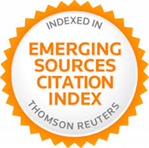Apocalypsis as Posttraumatic Simulacrun in Emilio Bueso's "Cenital"
DOI:
https://doi.org/10.37536/preh.2013.1.2.1014Keywords:
Post-apocalyptic, Trauma, Simulacrum, Acting out, End, Emilio Bueso, CenitalAbstract
The objective of this article is to answer a question: can there be an original social narrative after the end of the current postmodern era? Following poststructuralist theorists' different presumable ends –historical, meta-narrative, etc… -, this study wants to illustrate how a secular apocalypse works as a discursive and narrative strategy to speak about the human impossibility to generate new and original fictive social constructs in the aftermath of a catastrophe. This analysis is applied to Spaniard Emilio Bueso's novel, Cenital (2012). At times extremely post-apocalyptic, at others very dystopic, Cenital is always very insightful and self-reflexive regarding its status as a cultural product of the late capitalist era. Its narration unveils the needs, contradictions and fears of postmodern society when facing the idea of the End, and it is thanks to those states that the uncertainty that guides this study's hypothesis can be made explicit.
References
Baccolini, Rafaela y Moylan, Tom (ed.) (2003): Dark Horizons. Science Fiction and the Dystopian Imagination. Nueva York, Taylor & Francis Group.
Baudrillard, Jean (1989): “Simulacra and Simulations”. Trad. de Paul Foss, Paul Patton y Phillip Beitchman. En: Poster, Mark (ed.): Selected Writings. Oxford, Blackwell/Polity, pp. 166-184.
Baudrillard, Jean (1989b): “The Anorexic Ruins”. En Kamper, Dietmar y Wulf, Christoph (eds.): Looking Back on the End of the World. Trad. de David Antal. Nueva York, Semiotext(e), pp. 29-45.
Berger, James (1999): After the End. Representations of Post-Apocalypse. Minneapolis, University of Minnesota Press.
Bueso, Emilio (2012): Cenital. Madrid, Salto de Página.
Dieterle, Eric (2002): “Wasteland or Sanctuary? Post-Apocalyptic Life in a Nuclear Landscape”. En: Interdisciplinary Studies in Literature Environment, vol. 9, n.º 2, pp. 763-786.
Domingo, Andreu (2008): Descenso literario a los infiernos demográficos. Barcelona, Anagrama.
Edwards, Caroline (2009): “Microtopias: the Post-Apocalyptic Communities of Jim Grace’s The Pesthouse”. En: Textual Practice, vol. 23, n.º 5, pp. 763-786.
Foucault, Michel (1976): Vigilar y castigar. Buenos Aires, Siglo XXI.
Foucault, Michel (2008): Seguridad, Territorio, Población. Trad. de Horacio Pons. Madrid, Akal.
Heffernan, Theresa (2008): Post-Apocalyptic Culture. Modernism, Postmodernism and the Twentieth-Century Novel. Toronto, University of Toronto Press Incorporated.
Heuser, Sabine (2003): Virtual Geographies: Cyberpunk at the Intersection of the Postmodern and Science Fiction. Nueva York, Rodopi.
Jameson, Frederic (1994): The Seeds of Time. Nueva York, Columbia University Press.
Jameson, Frederic (2005): Archeologies of the Future. The Desire Called Utopia and Other Science Fictions. Londres, Verso.
Levitas, Ruth (1990): The Concept of Utopia. Nueva York, Syracusse University Press.
Manjikian, Mary (2012): Apocalypse and Post-Politics. The Romance of the End. Plymouth, Lexington Books.
Moreno, Fernando Ángel (2010): Teoría de la Literatura de Ciencia Ficción: Poética y retórica de lo prospectivo. Vitoria, Portal Editions.
Moylan, Tom (2000): Scraps of the Untainted Sky. Colorado: Westview Press.
Pordzik, Ralph (ed.) (2009): Futurescapes. Space in Utopian and Science Fiction Discourses. Nueva York, Rodopi.
Sargent, Lyman Tower (1975): “Utopia – The problema of Definition”. En: Extrapolation vol. 16, n.º 2, pp. 137-148.
Sargent, Lyman Tower (1994): “The Three Faces of Utopianism Revisited”. En: Utopian Studies, vol. 5, n.° 1, pp. 1-38.
Schlobin, Roger C. (2004): “Dark Shadows and Bright Lights: Generators and Maintainers of Utopias and Dystopias”. En Batter, Martha (ed.): The Utopian Fantastic. Selected Essays from the Twentieth International Conference on the Fantastic in the Arts. Westport, Praeger Publishers, pp. 11-16.
Suvin, Darko (1973): “Defining the Literary Genre of Utopia: Some Historical Semantics, Some Genology, a Proposal, and a Plea”. En: Studies of the Literary Imagination, n.º 2, pp. 121-145.
Downloads
Published
How to Cite
Issue
Section
License
Copyright (c) 2013 Pasavento. Revista de Estudios Hispánicos

This work is licensed under a Creative Commons Attribution 4.0 International License.








